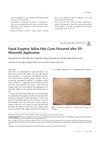 2 citations,
January 2023 in “Prague Medical Report”
2 citations,
January 2023 in “Prague Medical Report” JAK inhibitors, like baricitinib, are effective and safe for treating alopecia areata.
 1 citations,
October 2017 in “Dermatologic Clinics”
1 citations,
October 2017 in “Dermatologic Clinics” Men are increasingly using energy-based skin treatments for workplace success, with lasers and other devices effectively improving skin and body appearance.
 December 2021 in “The Sri Lanka Journal of Dermatology”
December 2021 in “The Sri Lanka Journal of Dermatology” COVID-19 can cause various skin issues, including rashes and lesions.
 November 2015 in “European Journal of Inflammation”
November 2015 in “European Journal of Inflammation” Cicatricial alopecia, a permanent hair loss condition, is mainly caused by damage to specific hair follicle stem cells and abnormal immune responses, with gene regulator PPAR-y and lipid metabolism disorders playing significant roles.
 April 2012 in “Informa Healthcare eBooks”
April 2012 in “Informa Healthcare eBooks” Classifying hair diseases, like alopecia, is difficult and needs more research to understand their causes.
 January 2010 in “Elsevier eBooks”
January 2010 in “Elsevier eBooks” The document concludes that different types of hair loss have specific treatments, and early diagnosis is crucial for preventing permanent hair loss.
 11 citations,
January 2015 in “Annals of Dermatology”
11 citations,
January 2015 in “Annals of Dermatology” Using a hair removal laser can make hairs finer for better hairline correction in hair transplants, with most patients happy and few side effects.
 3 citations,
January 2018 in “Annals of Dermatology”
3 citations,
January 2018 in “Annals of Dermatology” A woman developed facial hair cysts after using a 3% minoxidil solution for hair loss, which disappeared after stopping the treatment and removing the cysts surgically.
 2 citations,
June 2022 in “International Journal of Biomedicine”
2 citations,
June 2022 in “International Journal of Biomedicine” The review suggests a comprehensive approach to treat hirsutism, focusing on hair removal, medication, and managing emotional effects.
 2 citations,
January 2014 in “Springer eBooks”
2 citations,
January 2014 in “Springer eBooks” The book details skin conditions in older adults, their link to mental health, cancer treatment importance, hair loss remedies, and managing autoimmune and itchy skin.
 1 citations,
March 2019 in “Actas Dermo-Sifiliográficas”
1 citations,
March 2019 in “Actas Dermo-Sifiliográficas” New cancer treatments are less harmful to hair but can still cause hair loss, color, shape, and growth changes.
 1 citations,
October 2018 in “InTech eBooks”
1 citations,
October 2018 in “InTech eBooks” The document concludes that treatments for cicatricial alopecia are not well-supported by evidence, but hair transplantation shows more predictable and satisfactory results.

Use the least toxic, most specific treatments for skin diseases, considering side effects and individual patient needs.
 243 citations,
September 2016 in “Dermatology and Therapy”
243 citations,
September 2016 in “Dermatology and Therapy” Dermoscopy is a useful tool for identifying features of skin conditions, but more research is needed to define its role in dermatology.
33 citations,
October 2016 in “Photomedicine and laser surgery” Future clinical uses of Intense Pulsed Light (IPL) are likely to grow and become more effective with new advancements and combined treatments.
 25 citations,
February 2012 in “The Journal of Allergy and Clinical Immunology”
25 citations,
February 2012 in “The Journal of Allergy and Clinical Immunology” Finasteride caused a rare skin rash in a man, which improved after stopping the medication.
 16 citations,
August 1967 in “JAMA”
16 citations,
August 1967 in “JAMA” Oral contraceptives may cause hair loss in women.
 14 citations,
August 2006 in “Clinical and Experimental Dermatology”
14 citations,
August 2006 in “Clinical and Experimental Dermatology” A girl with no hair neglect developed plica neuropathica in the hospital, lost all her hair, but it grew back.
 5 citations,
November 2019 in “Dermatology and therapy”
5 citations,
November 2019 in “Dermatology and therapy” Beard hair extraction improves scalp hair restoration results in East Asian men with severe hair loss.
 3 citations,
July 2017 in “Elsevier eBooks”
3 citations,
July 2017 in “Elsevier eBooks” Skin reactions are a common reason for emergency visits due to drug allergies, with some severe cases needing intensive care.
 November 2024 in “Cureus”
November 2024 in “Cureus” Early diagnosis and personalized treatment can prevent damage from dissecting cellulitis after hair restoration surgery.
 January 2023 in “Indian Dermatology Online Journal”
January 2023 in “Indian Dermatology Online Journal” Bimatoprost and clobetasol are both effective for scalp hair loss, but bimatoprost works faster, has fewer side effects, and grows more colored hair.
 54 citations,
March 1987 in “Journal of The American Academy of Dermatology”
54 citations,
March 1987 in “Journal of The American Academy of Dermatology” 3% topical minoxidil effectively treats extensive alopecia areata with few side effects.
 40 citations,
May 2012 in “British Journal of Dermatology”
40 citations,
May 2012 in “British Journal of Dermatology” Recognizing specific features of African-American hair can help diagnose hair loss conditions.
39 citations,
November 2017 in “PubMed” Low-dose naltrexone helps reduce symptoms and slow down lichen planopilaris without side effects.
 28 citations,
February 2014 in “Journal of Telemedicine and Telecare”
28 citations,
February 2014 in “Journal of Telemedicine and Telecare” Smartphone-based teledermatology is effective for diagnosing skin diseases in the military with good accuracy.
 19 citations,
June 2009 in “Seminars in cutaneous medicine and surgery”
19 citations,
June 2009 in “Seminars in cutaneous medicine and surgery” Proper education can prevent traction alopecia in women of color.
 12 citations,
July 2011 in “European Journal of Dermatology”
12 citations,
July 2011 in “European Journal of Dermatology” The VSCAPSI is a helpful method for evaluating the severity of scalp psoriasis.
 4 citations,
June 2021 in “Wounds-a Compendium of Clinical Research and Practice”
4 citations,
June 2021 in “Wounds-a Compendium of Clinical Research and Practice” Chronic scalp lesions with crusts and pus that heal with strong topical steroids suggest Erosive Pustular Dermatosis, confirmed by biopsy showing specific immune cells.
 2 citations,
December 2023 in “JEADV. Journal of the European Academy of Dermatology and Venereology/Journal of the European Academy of Dermatology and Venereology”
2 citations,
December 2023 in “JEADV. Journal of the European Academy of Dermatology and Venereology/Journal of the European Academy of Dermatology and Venereology” The document suggests a new way to categorize skin and mind disorders into two main groups to reduce confusion.




























